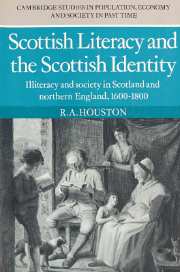 Scottish Literacy and the Scottish Identity
Scottish Literacy and the Scottish Identity Book contents
- Frontmatter
- Contents
- Tables
- Abbreviations
- Preface
- 1 The ideal of Scottish literacy
- 2 Structures and trends in illiteracy in the seventeenth and eighteenth centuries
- 3 Illiteracy in mid seventeenth-century Britain
- 4 The reasons for literacy
- 5 Measures of literacy
- 6 Oral culture and literate culture
- 7 The politics of literacy
- 8 Literacy and the Scottish identity
- Appendices
- Bibligraphy
- Index
6 - Oral culture and literate culture
Published online by Cambridge University Press: 11 November 2009
- Frontmatter
- Contents
- Tables
- Abbreviations
- Preface
- 1 The ideal of Scottish literacy
- 2 Structures and trends in illiteracy in the seventeenth and eighteenth centuries
- 3 Illiteracy in mid seventeenth-century Britain
- 4 The reasons for literacy
- 5 Measures of literacy
- 6 Oral culture and literate culture
- 7 The politics of literacy
- 8 Literacy and the Scottish identity
- Appendices
- Bibligraphy
- Index
Summary
The ability to sign one's name in full on a document provides us with the best criterion which we can use for statistical analysis of literacy. Some sort of quantitative study is essential if we are to cut through the claims and counter–claims about Scottish education and learning. In the Times Literary Supplement of 7 April 1966 Keith Thomas stated that 'all historical propositions relating to the behaviour of large groups, for example, about illiteracy and religious activity, are susceptible of treatment in this [statistical] way, and indeed permit of no other'. This is very true, since quantitative analysis allows us both to test existing hypotheses and to generate new ones. But just as there are other ways of measuring literacy so too are there other modes of understanding it. Quantification tells us about the structures of literacy in Scottish and English society, but reveals little about the importance of literacy in cultural, social, economic and political life. We have already looked at some of the reasons why men and women might wish to become literate. It was becoming simpler, cheaper and safer to understand reading, writing and counting. Now let us examine how compelling these reasons for literacy actually were.
Much of the discussion so far has been predicated upon the common assumption that literacy is an important, desirable capability which all individuals would wish to acquire. It is also usual to accept that all societies will eventually achieve mass literacy and that until this is attained full economic, social and intellectual development cannot occur.
- Type
- Chapter
- Information
- Scottish Literacy and the Scottish IdentityIlliteracy and Society in Scotland and Northern England, 1600–1800, pp. 193 - 210Publisher: Cambridge University PressPrint publication year: 1985
